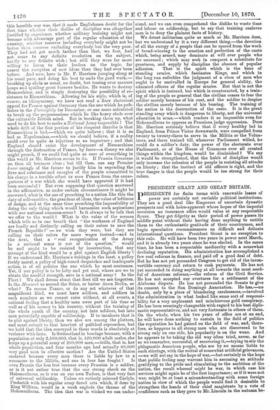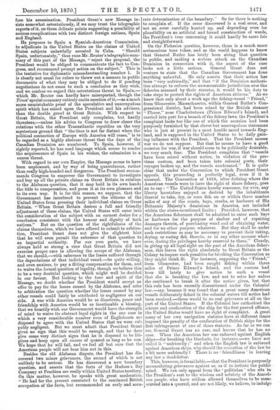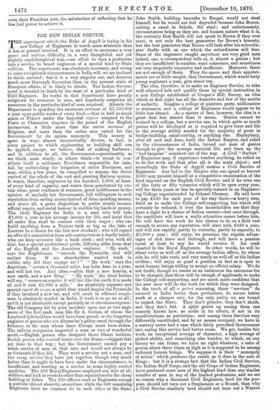PRESIDENT GRANT AND GREAT BRITAIN.
PRESIDENTS for finite terms with renewable leases of power are certainly not enviable political institutions. They are a good deal like Emperors of uncertain dynastic prospects and with heirs-apparent whose hopes of the imperial reversion no insurance office would value at any respectable figure. They get fidgetty as their period of power passes its middle point without their having done anything to entitle them to the enthusiastic gratitude of their countrymen, and begin speculative reconnaissances on difficult and delicate international questions. President Grant is no exception to this rule. He will have been two years in power next March, and it is already two years since he was elected. In the mean time, he has been a respectable mediocrity with a somewhat declining reputation. His administration has accomplished a few real reforms in finance, and paid off a good deal of debt. But he has not yet persuaded Congress to get rid of the incon- vertible currency and return to cash payments. He has not yet succeeded in doing anything at all towards the most need- ful of American reforms,—the reform of the Civil Service. He has not accepted our overtures for a settlement of the Alabama dispute. He has not persuaded the Senate to give its consent to the San Domingo Annexation. He has,—no doubt, only by a piece of blundering carelessness,—involved the administration in what looked like some sort of responsi- bility for a very unpleasant and mischievous gold conspiracy. He has been seemingly changeable with regard to his best diplo- matic representatives, and not very fortunate in others of them. On the whole, when his two years of office are at an end, he will have done nothing to sustain in the field of politics the reputation he had gained on the field of war, and, there- fore, as happens to all strong men who are discovered to be strong only on one side, his popularity is on the wane. And he appears to be taking the old way often tried, never, as far as we remember, successful, of recovering it,—trying to stir the phlegmatic American people, who are by no means liable to such stirrings, with the recital of somewhat artificial grievances, —we will not say in the hope of war,—but certainly in the hope that public feeling may warrant him in assuming an attitude gratifying to the pride and stimulating to the ambition of the nation, the result whereof might be war, in which case his services might again be of the first importance; or if it were not war, might be at least a misunderstanding with some foreign nation in view of which the people would find it desirable to strengthen the hands of their chief magistrate by a vote of confidence such as they gave to Mr. Lincoln in the autumn be-
fore his assassination. President Grant's new Message in- sists somewhat ostentatiously, if we may trust the telegraphic reports of it, on three delicate points suggesting a possibility of serious complications with two distinct foreign nations, Spain and England.
He proposes to Spain a Spanish-American Commission, to adjudicate in the United States on the claims of United States subjects unlawfully arrested in Cuba. " Should Spain, unfortunately," thus runs Mr. Reuter's telegraphic sum- mary of this part of the Message, " reject the proposal, the President would be obliged to communicate the fact to Con- gress, and recommend prompt action on the subject." This is the tentative for diplomatic misunderstanding number 1. It is clearly not usual for rulers to throw out a menace in public documents of what they may be obliged to do if pending negotiations do not come to such a conclusion as they wish, and we confess we regard this ostentatious threat to Spain,— which Mr. Reuter can hardly have misreported, though the Times' special summary entirely omits mention of it,—as a much more unmistakable proof of the speculative and unscrupulous spirit which has seized upon the President and his advisers, than the doable growl at Great Britain. With respect to Great Britain, the President only complains, but hardly threatens,—unless his advice to Congress to draw closer the relations with the other Transatlantic republics on the very mysterious ground that " the time is not far distant when the political connection of Europe with America will cease," is to be regarded as a highly abstruse threat that the days of the Canadian Dominion are numbered. To Spain, however, if rightly reported, he has used language which seems to render the acquiescence of Spain in his wishes, the submission to a coarse threat.
With regard to our own Empire, the Message seems to have been unpleasant, and by way of being quarrelsome, rather than really high-handed and dangerous. The President reco m- mends Congress to empower the Government to investigate and buy up all the private claims on Great Britain in relation to the Alabama question, that it may hold in its own hands the title to compensation, and press it at its own pleasure and in its own way. It is for this reason, we suppose, that the Government has interfered to prevent the citizens of the United States from pressing their individual claims on Great Britain. "When Great Britain desires a full and friendly adjustment of these claims, the United States will enter into the consideration of the subject with an earnest desire for a conclusion consistent with the honour and dignity of both nations." But on the question of the rightfulness of the claims themselves, which we have offered to submit to arbitra- tion, President Grant does not give the "slightest hint that he will even permit the reference of that question to an impartial authority. For our own parts, we have always held so strong a view that Great Britain did not exercise proper care in allowing the escape of the Alabama, that we should,—with reference to the losses suffered through the depredations of that individual vessel, be quite willing, and even anxious, to pay a fitting compensation for them, and to waive the formal question of legality, though we believe this to be a very doubtful question, which might well be decided in our favour. But looking to the tone and spirit of the Message, we doubt whether the President would accept an offer to pay for the losses caused by the Alabama, and refer to arbitration the question whether the losses caused by any other vessels could fairly be attributed to negligence on our side. A war with America would be so disastrous, peace and friendship with America would be so inestimable a blessing, that we heartily wish our Government would have the strength of mind to waive its abstract legal rights in the one case in which a very considerable number even of Englishmen are disposed to agree with the United States that we were cul- pably negligent. But we must admit that President Grant gives no sign that this would be enough, and that he does give some very distinct signs that he is disposed to be liti- gious and keep open all causes of quarrel as long as he can. We hope that be will fail, and we feel all but sure that the American people will not bear him out in this. Besides the old Alabama dispute, the President has dis- covered two minor grievances, the second of which is not unlikely to be serious. He has discovered a new boundary question, and asserts that the forts of the Hudson's Bay Company at Pembina are really within United States territory. On this matter, however, he speaks with great moderation. " He had for the present consented to the continued British occupation of the forts, but recommended an early and accu- rate determination of the boundary." So far there is nothing to complain of. If the error discovered is a real error, and not an error carefully hunted up, and depending even for plausibility on an artificial and forced construction of words, the President's tone concerning it could hardly be more fair and straightforward.
On the Fisheries question, however, there is a much more acrimonious tone taken, and as the world happens to know that General Butler has lately been airing that question in public, and making a serious attack on the Canadian Dominion in connection with it, the aspect of •the case looks not a little serious. General Grant does not venture to state that the Canadian Government has done anything unlawful. He only asserts that their action has been " very unfriendly," and that " if the Dominion authori- ties attempt to enforce the unwarrantable jurisdiction over the fisheries assumed by their statutes, it would be his duty to take steps to protect the rights of American citizens." As we know that only about a week ago the fishing-vessel " Friend," from Gloucester, Massachusetts, within General Butler's Con- gressional district, had been seized by the British steamer " Plover," near Charlottetown (Prince Edward's Island), and carried into port for a breach of the fishery laws, the President's complaint looks too like one of which the occasion had been purposely furnished by that clever but unscrupulous statesman who is just at present in a most hostile mood towards Eng- land, and is supposed in the United States to be daily gain- ing influence with the President. That the President means war we do not suppose. But that he means to have a good occasion for war, if war should seem to be politically desirable, we very much fear. The President complains that "vessels have been seized without notice, in violation of the pre- vious custom, and been taken into colonial ports, their voyages broken up, and the vessels condemned." It is quite clear that under the Convention to which President Grant appeals, this proceeding is perfectly legal, even if it is unusual. The Convention of 1818, after defining where the American vessels were to have the right of shore fishery, goes on to say : " The United States hereby renounce, for ever, any liberty heretofore enjoyed or derived by the inhabitants thereof to take, dry, or cure fish on or within three marine miles of any of the coasts, bays, creeks, or harbours of His Britannic Majesty's dominions in America, not included within the above-mentioned limits ; Provided, however, that the American fishermen shall be admitted to enter such bays or harbours for the purpose of shelter and of repairing damages therein, of purchasing wood and of obtaining water, and for no other purpose whatever. But they shall be under such restrictions as may be necessary to prevent their taking, drying, or curing fish therein, or in any other manner what- ever, during the privileges hereby reserved to them." Clearly, in giving up all legal right on the part of the American fisher- men, this leaves the right absolutely to Great Britain or the Colony to impose such penalties for breaking the Convention as they might think fit. For instance, supposing the "Friend," from Gloucester, had been caught fishing within three miles of Prince Edward's Island, and the custom had been till lately to give notice to such a vessel that she is breaking the law, and not to seize her unless she continued to break it after the notice given, but that this rule has been recently discontinued under the Colonial law,—say, because it was found that a great many American vessels deliberately fished in the colonial waters till notice had been received,—there would be no real grievance at all on the part of the United States. If the Colonial law authorized the seizure and confiscation of the ship for the first proved offence, the United States would have no right of complaint. A great many of her own navigation statutes have at different times imposed the penalty of the confiscation of British ships for the first infringement of one of those statutes. As far as we can see, General Grant has no case, and knows that he has no case. When the American law was enforced against English ships—for breaking the blockade, for instance,—we have not called it " unfriendly ;" and when the English law is enforced against American ships, why should the execution of the law be a bit more unfriendly ? There is no friendliness ' in leaving any law a dead-letter.
This, however, is formidable,—that the President is purposely accumulating grievances against us, as if to irritate the public mind. We can only appeal from the politician ' who sits in the President's seat to the wisdom and sobriety of the Ameri- can people, who have seldom allowed themselves to be man- oeuvred into a quarrel, and are not likely, we believe, to indulge even their President with the satisfaction of reflecting that he has had power to achieve it.




































 Previous page
Previous page